A list of films produced in Argentina in 1948:
Malaya refers to a number of historical and current political entities related to what is currently Peninsular Malaysia in Southeast Asia:
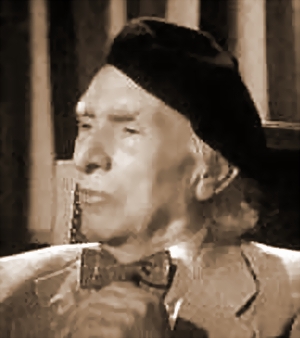
John Alton, born Johann Jacob Altmann, in Sopron, Kingdom of Hungary, was an American cinematographer of Hungarian-German origin. Alton photographed some of the most famous films noir of the classic period and won an Academy Award for the cinematography of An American in Paris (1951), becoming the first Hungarian-born person to do so in the cinematography category. He also worked as a director during the Golden Age of Argentine cinema.
Josip Broz Tito (1892–1980) was a Yugoslav communist revolutionary and statesman.
In art, neorealism refers to a few movements.

Argentina at the 1948 Summer Olympics in London, England was the nation's eighth appearance out of eleven editions of the Summer Olympic Games. Argentina sent to the 1948 Summer Olympics its fifth national team, under the auspices of the Argentine Olympic Committee of 199 athletes who competed in 101 events in 16 sports. It would not be until the 2016 Summer Olympics that the athlete delegation were surpassed. The medals haul of 3 golds, 3 silvers, and a bronze tied the medals haul in 1928. The achievement of 7 medals in an edition of the Olympics has yet to be matched.

Valentín Alsina is a city in the Lanús Partido of Buenos Aires Province, Argentina. It is located next to Buenos Aires city in the Gran Buenos Aires urban area.
This is an index to pages listing Argentine films ordered by year of release. For an A-Z list, see Category:Argentine films.
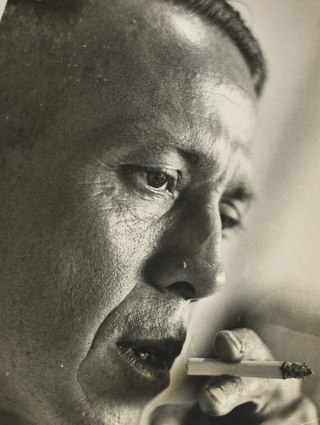
Carlos Hugo Christensen was an Argentine film director, screenwriter and film producer, an iconic figure of the classical era of Argentine cinema.

Daniel Tinayre was a French-born Argentine film director, screenwriter and film producer notable for his work during the classical era of Argentine cinema (1930s–1950s) and the 1960s.
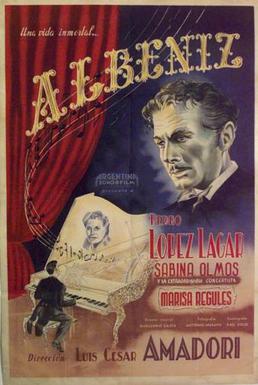
Albéniz is a 1947 black-and-white Argentine biographical drama film of the classical era of Argentine cinema, directed by Luis César Amadori and written by Pedro Miguel Obligado. The film is based on the life of Spanish composer and pianist, Isaac Albéniz, one of the foremost composers of the Post-romantic era.

Mario Soffici was an Italian-born Argentine film director, actor and screenwriter notable for his work during the Golden Age of Argentine cinema.

Pierre Bruno Hugo Fontana, otherwise known as Hugo del Carril, was an Argentine film actor, film director and tango singer of the Golden Age of Argentine cinema.

Manuel Romeo was an Argentine film director, screenwriter, dramatist and score composer, one of the most important figures of the Golden Age of Argentine cinema. He directed and wrote over 50 films between 1931 and 1951 even composing the musical scores for several.
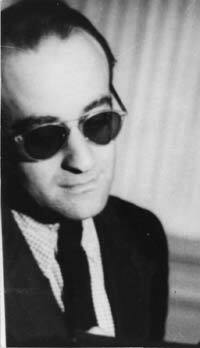
Luis Saslavsky was an Argentine film director, screenwriter and film producer, notable for his work during the classical era of Argentine cinema.
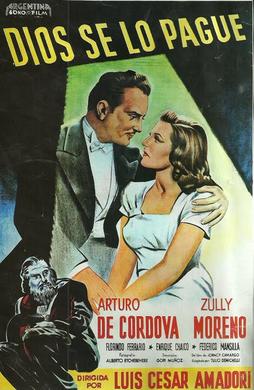
God Reward You is a 1948 Argentine melodrama film of the classical era directed by Luis César Amadori and starring Arturo de Córdova and Zully Moreno, produced during the classical era of Argentina cinema. It won the Silver Condor Award for Best Film, given by the Argentine Film Critics Association in 1949 for the best picture of the previous year.

Lucas Demare was an Argentine film director, screenwriter, and film producer notable for his work during the classical era of Argentine cinema and beyond.

Francisco Álvarez was an Argentine film and theater actor, notable for his work during the Golden Age of Argentine cinema.

Sixto Pondal Ríos was an Argentine screenwriter, poet and dramatist.

María Elena Lucena Arcuri was an Argentine film actress of the Golden Age of Argentine cinema. She began her career in radio in the 1930s and reached her greatest success with the role of "Chimbela", which was later depicted in film, theater and television. Her extensive film career includes approximately 50 films, including notable performances in Chimbela (1939) and Una noche cualquiera (1951). During the 1940s, she participated in films with comedians like Pepe Arias, Pepe Iglesias "El Zorro", Niní Gambier, Mirtha Legrand and Carlos Estrada. Her most acclaimed film work occurred in Elvira Fernández, vendedora de tienda (1942) by Manuel Romero, Cinco besos by Luis Saslavsky and La Rubia Mireya for which she received the 1948 Best Comedy Actress Award from the Argentine Film Critics Association.